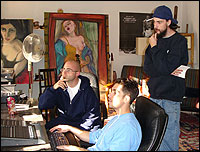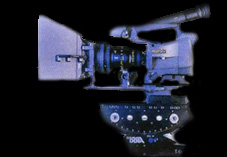 |
Get a Mentor
Hot Line
(714) 840-6369

Send this page to a friend
Newsletter Signup
Become a mentor
Articles
Newsweek
MSNBC
Netscape.com
Mix Magazine
Billboard
Resources
Links
Musician Contacts
Tips/Articles
Other Info
Additonal Services
Music Promotions
Video Productions
Acting & Modeling
|
ZDT Entertainment is a
fully accredited institute
of education.
"The one-to-one tutoring concept is second to none. I
was bored in traditional school, after all I'm a college drop out!"
~ David Geffen
Director, Screenwriter
"It occured to me many years ago that the only way to
learn this business was to be in it."
~ Stephen Spielberg
Director,
Producer
"Not only did I not go to college for broadcasting, I
never even finished high school. I did however get my foot in the
door, and since have been awarded over 8 Emmys for news
reporting."
~ Peter Jennings
World News
Tonight
"Fifty-eight members of The Forbes 400 either avoided
college or ditched it partway through."
~ Forbes Magazine
"We're stuck in an 18th century concept of how you
educate — it is a very bad system."
~ George Lucas
Director,
Producer
"When the students don't learn, the school must
change."
~ Bill Gates
Microsoft
Co-founder
"You do not want to do a Film School. What they have
today that works far better is mentorships."
~ John Waters
Director,
Screenwriter
". . . the only way to be truly satisfied is to do
what you believe is great work. And the only way to do great work is
to love what you do. If you haven't found it yet, keep
looking."
~ Steve Jobs
Apple Computer
CEO
"Music was a way to success. It was a way to education. And it was a way to a brighter day for me."
~ Little Richard
"I don't want the valedictorian, I want the kid who sold
cigarettes in the bathroom."
~ Robert Wallach
Insurance Company
CEO
"The road to happiness lies in two simple principles;
find what interests you and that you can do well, and put your whole
soul into it — every bit of energy and ambition and natural ability
you have."
~ John D. Rockefeller
Investor,
Philanthropist
"All of our dreams can come true, if we have the courage
to pursue them."
~ Walt Disney
Walt Disney Company
"I ain't got much education, but I got some sense....
In the long run, you make your own luck - good, bad, or indifferent."
~ Loretta Lynn
"Dreams do come true, even for someone who couldn't speak English and never had a music lesson or much of an education."
~ Lawrence Welk
ZZZZZZZZZZZZZZZZZZZ
ZZZZZZZZZZZZZZZZZZZZ
DDDDDDDDDDDDDDDDDD
DDDDDDDDDDDDDDDDD
TTTTTTTTTTTTTTTTT
TTTTTTTTTTTTTTT
ZZZZZZZZZZZZZZZZZZZ
ZZZZZZZZZZZZZZZZZZZZ
DDDDDDDDDDDDDDDDDD
DDDDDDDDDDDDDDDDD
TTTTTTTTTTTTTTTTT
DDDDDDDDDDDDDDDDD
TTTTTTTTTTTTTTTTT
TTTTTTTTTTTTTTT
|
 |
|
|
|
|
Frequently Asked Questions
A PROVEN METHOD THAT WORKS!
|
|
|
How Does the Program
Work?
We contract with Radio/TV Stations, Recording Studios/Record
Companies, and Film/Video Production companies to train and mentor
aspiring talented apprentices.
 Who Will My Mentor Be? Who Will My Mentor Be?
A mentor is a professional in the field, for example the
Program Director/Production Director of a local radio and TV station, the
owner or Chief Engineer of a recording studio, or a Film Producer or
Director.
 Why is Your Graduate Employment Rate So
High? Why is Your Graduate Employment Rate So
High?
The mentors, leading working professionals in their fields,
dread the day when they might have to sort through the resumes of college
graduates who haven't a clue what the business is really all
about.
|
The inevitable employment through our apprentice program is in
large part due to the fact that training is always done ONE-TO-ONE. One
student apprentice, one instructor or mentor.

Rather than the faceless resume, it is far more realistic to
expect that they will hire their own private student apprentice that they
have hand-picked, groomed and taught on the job, in the real
world.

Has This Method Been Around Very
Long?

Our method is not new. It is a throwback to the apprentice
method of training during the Renaissance period. In the 12th century, if
you wanted to be an artist you didn't go to school, you went to work for
an artist and you were not paid for your labor. On the contrary, you paid
for the privilege of working for free. And people stood in line to do it
with the right master. If your father wasn't already doing it, or your
uncle or at least a cousin, it was the only way to enter a profession.
Can I Work This Around
My Present Job and Schedule?

If you are accepted into the program, your training can take
place during your off-hours, evenings and weekends and can be completed in
four to nine months. Because these apprentice programs are self-paced and
literally one-to-one, they can accommodate any schedule. No matter what
your schedule might be, you can fit this in. It might take you longer to
finish, but you can definitely do it. You can't use that old excuse that
you don't have time to do what you've always wanted to do.
What if My Schedule Changes?
The expectations are that most applicants can manage at least
once-a-week sessions in the beginning and let that weekly assignment
session "evolve" into the needs and requirements of the parties involved.
The nature of the "relationship" is that it can be adjusted from
once-a-week meetings to five times a week, to once every month and
everything in between. It can be stopped, put on hold, sped up, slowed
down, or moved to another city if need be.
What Does the Placement Include?
You will receive the same text material and homework
assignments of any school, college or university program. (The curriculum and any pertinent textbooks or manuals is determined by
the individual mentor). The difference — and it's a big difference — is
that your mentor/instructor in our program will not be a college professor
or a grad student with 30 - 60, or more, other students vying for
attention in a classroom or lecture hall. They will be a working veteran —
a professional who is currently in the field — the Program Director, Chief
Audio Engineer, Film Producer or Director.
What is the Placement Fee?
Our placement fee is $6,950* for Radio and Recording and $7950
for T.V. and Film. Compare that to so-called traditional or typical trade
school tuition in Broadcasting, Music, Recording or Film, that can run
from $20,000 to as much as $80,000! If you've been interested in doing
this for a while and have been checking out these training facilities, you
are well aware of the costs. Colleges and universities, of course, are
even more expensive. The resulting loss of income during this period of
time (as much as four years) adds even more to the cost.
With the Apprentice-Mentor method, you work your training
schedule around your work schedule, enabling you to earn as you learn.
 |
Why Do You Cost Less
Than Other Schools?
The reason why our apprentice training program is so
affordable compared to college or specialized training schools is that our
overhead is nowhere near that of a training facility or a college. The
studio, building, and all that equipment is already there. We don't own or
maintain the property. The only cost is for your instructor, the relative
text material and administration.
What Does the Mentor / Instructor Get Out of
This?
Fifty percent of the placement fee goes directly to your
tenured mentor/instructor. A tenured mentor (one who has successfully
mentored a "student" for us) is paid somewhat more than a first-time
mentor.
That's worth noting, because the most important part of the
education process is the faculty or the teacher. We recognize that
importance and reward it accordingly. Your mentor/instructor also receives
an incentive of up to $1,000 for your employment. However they will not
jeopardize their organization or accept you in the first place if they
don't think that they or someone else in the industry could hire you after
some on-the-job training.
It's as simple as that.
Realistically, What Kinds of Jobs Are Available
to Me?
Be prepared to start at the bottom of the ladder, and you may
have to keep your day job to pay the rent, at least at first.
Starting off usually begins with part-time work, nights and
weekends, the hours no one with a lot of experience wants.
But the opportunities are endless. They are created through
your talent, drive, hard work, cooperation and your association and
one-on-one rapport with your mentor. They are created from being there . .
. from just doing it . . . from being the right person, at the right time
with the right contacts.
Many of our apprentices are hired very early on in their
training, months away from formal completion of the program. As with all
aspects of life and work, talent is usually recognized and rewarded when
you make your desires known, but you must be given the opportunity to
display your potential and abilities in the proper arena where it will do
some good: on site and on-the-job.
Do I Need a College Degree to Work in the
Entertainment Industry?
No. Obviously higher education can only benefit an individual
and is encouraged, but it isn't required.
 |
|
Wouldn't I Be Better
Off Going to College and Getting a Communications Degree?
If you're thinking about college, you will be far better off
getting an English degree, an Arts degree, a Political Science degree or a
Music degree. Educate yourself in other areas.
The results speak for themselves. Even the best college
curriculums in the country don't place more than ten to twelve percent of
their communications majors into paid, entertainment positions. When you
do graduate and apply for a entertainment job with that communications
degree and resume in hand, you find yourself one of a hundred other
applicants for the same position. Never mind that you have a great
personality and you're a hard worker. You don't know anybody. Nobody knows
you. You still don't have any experience!
Most school curriculums simply don't provide students with the
experience necessary in the entertainment industry. They are "pretend "
environments and can't effectively communicate the economic realities of
having to attract documented ratings to be sold to advertisers.
Many Program Director/Production Director of local radio and
TV stations, owners or Chief Engineers of recording studios, and Film
Producers or Directors believe this: bad habits learned while "playing" in
school give aspiring employees such an unrealistic picture of the real
entertainment business, they are often considered worse off than someone
with no previous training at all!
The difference between the school atmosphere, and reality is
so great it has always been necessary to retrain these graduates when they
come to work for real. Not only do studios and stations have to retrain
these graduates, but they actually have to undo many of the bad habits
picked up at school. It's so much easier for them to simply take on their
own prescreened ZDT apprentice, from their local community, and train them
personally in the real world of entertainment!
 |
How is an
Apprenticeship Different From an Internship?
Most entertainment organizations cooperate with the local
schools by taking on interns. It used to be a very good way to break in to
this business. Today, there are still some very good internship programs
out there. On the whole though, internships don't provide anything
resembling the learning experience they used to. The problem is that every
college, university, and broadcast school in the land wants to get its
students "in the door" and into an internship. Entertainment organizations
are literally bombarded by requests to take on interns. They can't
possibly provide a meaningful educational experience to people in these
numbers. As a result, most interns these days spend their time in the
promotions department handing out bumper stickers in front of concerts and
such, and never get anything resembling training or work.
ZDT apprentices on the other hand, enter the station
differently. They're in a contractual relationship with their mentor who
has literally been hired to train them personally. The ZDT curriculum is
specific in its intent to develop skills leading to work. The goal, from
day one, is employment. Your mentor is even given a cash financial
incentive, paid only when you find work in this business, at a studio or
station where you trained, or at another studio or station across town
where your mentor "knew somebody".
Who Are You?
We are industry professionals offering on-the-job, one-on-one
training in Radio/TV, Recording, Video, Film, and other specialized fields
throughout the U.S., Canada, the UK and Australia.

|
|
|
|
|
|
|
|
|



